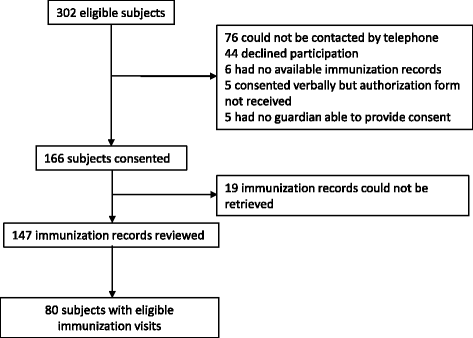Risk of seizures after immunization in children with epilepsy: a risk interval analysis
- PMID: 29642863
- PMCID: PMC5896155
- DOI: 10.1186/s12887-018-1112-0
Risk of seizures after immunization in children with epilepsy: a risk interval analysis
Abstract
Background: In children with epilepsy, fever and infection can trigger seizures. Immunization can also induce inflammation and fever, which could theoretically trigger a seizure. The risk of seizure after immunization in children with pre-existing epilepsy is not known. The study objective was to determine the risk of medically attended seizure after immunization in children with epilepsy < 7 years of age.
Methods: We conducted a retrospective study of children < 7 years of age with epilepsy in Nova Scotia, Canada from 2010 to 2014. Hospitalizations, emergency visits, unscheduled clinic visits, and telephone calls for seizures were extracted from medical records. Immunization records were obtained from family physicians and Public Health with informed consent. We conducted a risk interval analysis to estimate the relative risk (RR) of seizure during risk periods 0-14, 0-2, and 5-14 days post-immunization versus a control period 21-83 days post-immunization.
Results: There were 302 children with epilepsy who were eligible for the study. Immunization records were retrieved on 147 patients (49%), of whom 80 (54%) had one or more immunizations between the epilepsy diagnosis date and age 7 years. These 80 children had 161 immunization visits and 197 medically attended seizures. Children with immunizations had more seizures than either those with no immunizations or those with no records (mean 2.5 versus 0.7 versus 0.9, p < 0.001). The risk of medically attended seizure was not increased 0-14 days after any vaccine (RR = 1.1, 95% confidence interval (CI): 0.5-2.8) or 0-2 days after inactivated vaccines (RR = 0.9, 95% CI: 0.1-7.1) versus 21-83 days post-immunization. No seizure events occurred 5-14 days after live vaccines.
Conclusions: Children with epilepsy do not appear to be at increased risk of medically attended seizure following immunization. These findings suggest that immunization is safe in children with epilepsy, with benefits outweighing risks.
Keywords: Adverse event following immunization; Epilepsy; Seizure; Vaccination; Vaccine safety.
Conflict of interest statement
Ethics approval and consent to participate
The study received ethics approval from the IWK Research Ethics Board (Project #1016041). Caregivers of participants were required to provide verbal and/or written consent.
Competing interests
KAT has received research support and consultancy fees from Pfizer and a grant from GlaxoSmithKline outside the submitted work. The other authors have no disclosures.
Publisher’s Note
Springer Nature remains neutral with regard to jurisdictional claims in published maps and institutional affiliations.
Figures
References
-
- Callreus T. Perceptions of vaccine safety in a global context. Acta Paediatr. 2010;99:166–171. - PubMed
Publication types
MeSH terms
Substances
LinkOut - more resources
Full Text Sources
Other Literature Sources
Medical


